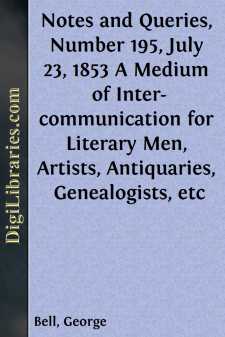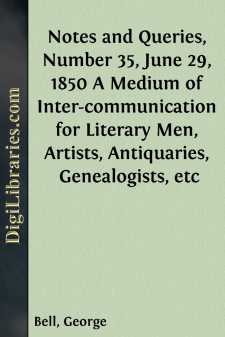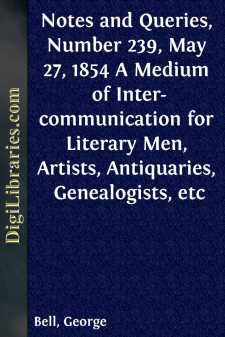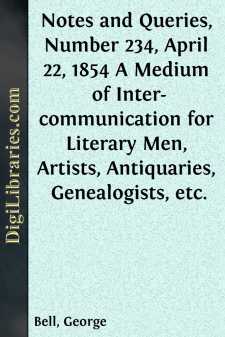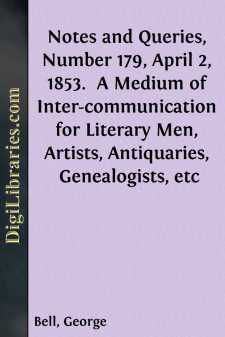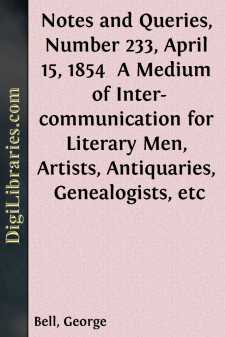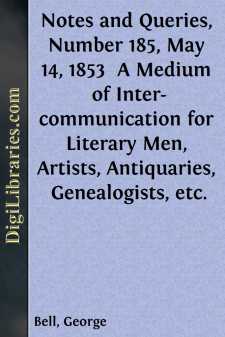Categories
- Antiques & Collectibles 13
- Architecture 36
- Art 48
- Bibles 22
- Biography & Autobiography 813
- Body, Mind & Spirit 142
- Business & Economics 28
- Children's Books 17
- Children's Fiction 14
- Computers 4
- Cooking 94
- Crafts & Hobbies 4
- Drama 346
- Education 46
- Family & Relationships 57
- Fiction 11829
- Games 19
- Gardening 17
- Health & Fitness 34
- History 1377
- House & Home 1
- Humor 147
- Juvenile Fiction 1873
- Juvenile Nonfiction 202
- Language Arts & Disciplines 88
- Law 16
- Literary Collections 686
- Literary Criticism 179
- Mathematics 13
- Medical 41
- Music 40
- Nature 179
- Non-Classifiable 1768
- Performing Arts 7
- Periodicals 1453
- Philosophy 64
- Photography 2
- Poetry 896
- Political Science 203
- Psychology 42
- Reference 154
- Religion 513
- Science 126
- Self-Help 84
- Social Science 81
- Sports & Recreation 34
- Study Aids 3
- Technology & Engineering 59
- Transportation 23
- Travel 463
- True Crime 29
Sort by:
by:
George Bell
WILLIAM BLAKE. My antiquarian tendencies bring me acquainted with many neglected and obscure individuals connected with our earlier English literature, who, after "fretting their hour" upon life's stage, have passed away; leaving their names entombed upon the title-page of some unappreciated or crotchetty book, only to be found upon the shelves of the curious. To look for these in Kippis,...
more...
by:
George Bell
GEORGE GORING, EARL OF NORWICH, AND HIS SON GEORGE, LORD GORING. G.'s inquiry (Vol. i., p. 22.) about the two Gorings of the Civil War—a period of our history in which I am much interested—has led me to look into some of the sources of original information for that time, in the hope that I might be enabled to answer his Queries. I regret I cannot yet answer his precise questions, when Lord...
more...
by:
George Bell
REPRINTS OF EARLY BIBLES. In 1833 the authorities of the Clarendon Press put forth a quarto reprint, word for word, page for page, and letter for letter, of the first large black-letter folio edition of 1611, of the present authorised or Royal version of the Bible. So accurate was it, that even manifest errors of the press were retained. It was published that the reader might judge whether the original...
more...
by:
George Bell
Minor Notes. Tippet.—The origin of words signifying articles of dress would be a curious subject for investigation. Tippet is derived by Barclay from the Saxon tæppet; but I find the following passage in Captain Erskine's Journal of his recent Cruise in the Western Pacific, p. 36. He is writing of the dress of the women at the village of Feleasan, in the Samoan Islands: "And occasionally a...
more...
by:
George Bell
JACK. I wish to note, and to suggest to students in ethnology, the Query, how it comes to pass that John Bull has a peculiar propensity to call things by his own name, his familiar appellative of Jack? Of all the long list of abbreviations and familiar names with which times past and present have supplied us, that which honest Falstaff found most pleasing to his ears, "Jack with my familiars!"...
more...
by:
George Bell
THE TOPOGRAPHER & GENEALOGIST, EDITED BY JOHN GOUGH NICHOLS, F.S.A. The XIIIth Part of this Work is now published, price 3s. 6d., containing: Some Account of the Manor of Apuldrefield, in the Parish of Cudham, Kent, by G. Steinman Steinman, Esq., F.S.A. Petition to Parliament from the Borough of Wotton Basset, in the reign of Charles I., relative to the right of the Burgesses to Free Common of...
more...
by:
George Bell
ENGLISH BOOKS OF EMBLEMS. It is a remarkable circumstance that whilst the emblems of Alciatus Vent through almost innumerable editions, and were translated into most of the continental languages, no version of these Emblems should ever have been printed in this country, although we believe that MS. translations of them are in existence. It is remarkable also that more than half century should have...
more...
by:
George Bell
THE "AGAPEMONE" OF THE SIXTEENTH CENTURY. As it is not generally known that the "Agapemone" had a prototype in the celebrated Family of Love, some account of this "wicked sect" may not at this moment be without interest to your readers:— "Henry Nicholas, a Westphalian, born at Munster, but who had lived a great while at Amsterdam, and some time likewise at Embden, was the...
more...
by:
George Bell
THE RELIGION OF THE RUSSIANS. Public attention being very particularly directed towards the Russian nation at the present time, a few remarks regarding some peculiarities in their manner of worship, &c., which probably are not generally known, may be interesting. I have been for some time past endeavouring to determine the exact nature of the homage the Russians pay to the "gods"—whether...
more...
by:
George Bell
A PROPHET. What a curious book would be "Our Prophets and Enthusiasts!" The literary and biographical records of the vaticinators, and the heated spirits who, after working upon the fears of the timid, and exciting the imaginations of the weak, have flitted into oblivion! As a specimen of the odd characters such a work would embrace, allow me to introduce to your readers Thomas Newans, a...
more...


